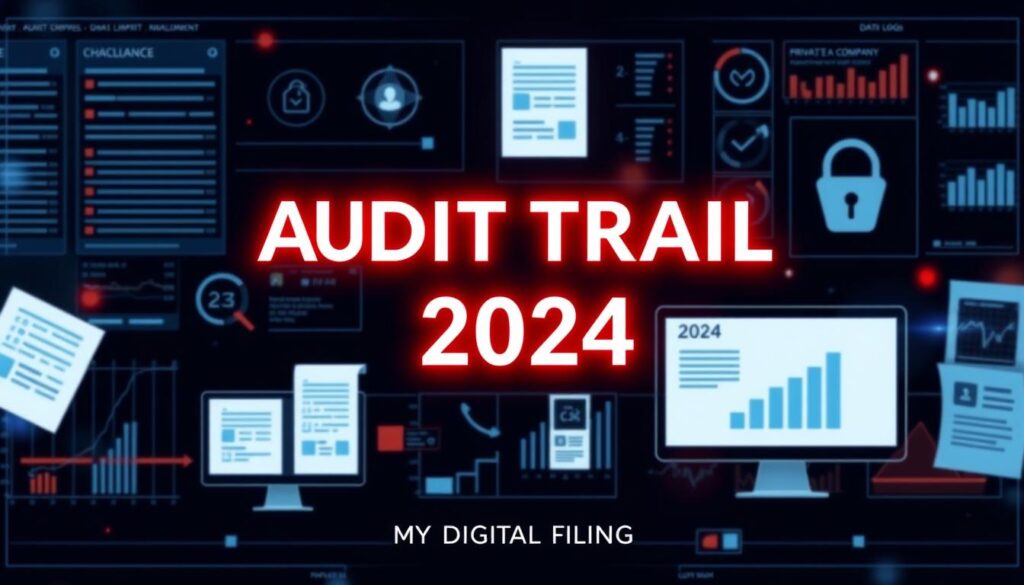The Ministry of Corporate Affairs (MCA) has made a big change. Now, all businesses, including private limited companies, must keep an audit trail for any changes to their financial records. This change is set to make financial reporting more transparent and accurate.
The new rule requires a detailed log of all transaction changes. This means every change to a transaction must be recorded. The software must show who made the change, what was changed, and when. Also, this feature cannot be turned off and must work all year.
This rule affects many types of companies. It includes Public and Private Limited Companies, One Person Companies (OPCs), and Government-owned Companies. It also covers Not-for-Profit Organizations and Nidhi Companies. But, it does not apply to Individuals, Proprietorship concerns, Partnership firms, and Limited Liability Partnerships (LLPs).
It’s important to make sure your accounting software meets the MCA’s standards. Certified Accountants (CAs) can help check your software and guide you. For help with your company audit, contact My Digital Filing. They have experienced professionals, including CAs, ready to assist you.
Key Takeaways:
- The MCA has mandated audit trail reporting for private limited companies starting from April 1, 2023.
- The audit trail feature must record all changes to transactions, including who made the change, what was changed, and when it occurred.
- The audit trail cannot be disabled and must remain operational throughout the year.
- The new rule applies to various types of companies but excludes Individuals, Proprietorship concerns, Partnership firms, and LLPs.
- Ensuring compliance with the new audit trail reporting requirements is crucial for maintaining accurate statutory records and avoiding penalties.
Understanding Audit Trail and Its Importance
An audit trail is key in any accounting system. It keeps a detailed record of all financial actions and changes. This log tracks every change, ensuring traceability and accountability. It helps companies keep their financial data accurate, transparent, and in line with laws.
Definition of Audit Trail
An audit trail is a detailed record of all actions and changes in an accounting system. It shows the full history of a transaction, from start to finish. It also tracks any changes or adjustments made.
This log makes it easy to track and trace financial data. It helps companies find any issues or problems.
The audit trail includes important info like:
- Transaction dates and times
- User identification and authorization details
- Original and modified transaction values
- Approval and rejection specifics
- System-generated information and error messages
Keeping a detailed audit trail ensures financial records are accurate and reliable. It’s a valuable tool for internal controls and external audits. It lets stakeholders check the authenticity and completeness of financial data.
Benefits of Maintaining an Audit Trail
Having a strong audit trail system brings many benefits to private companies:
- Enhanced Accountability: It assigns responsibility to users for each transaction and change, promoting accountability.
- Improved Data Integrity: It tracks every change to financial records, ensuring data accuracy and reliability.
- Regulatory Compliance: It helps companies meet legal and regulatory requirements, like those from the Ministry of Corporate Affairs (MCA) in India.
- Efficient Issue Resolution: It makes it easy to find and fix any issues by providing a detailed transaction history.
- Enhanced Security Measures: It acts as a deterrent against unauthorized access and manipulation of financial data, improving system security.
To meet the latest audit trail reporting needs for 2023-24, private companies should get help from experts like Chartered Accountants (CAs). At My Digital Filing, our team can guide you through the complexities of company audit filing and help you meet deadlines.
Understanding and implementing effective audit trail systems helps private companies improve their financial management. It strengthens internal controls and builds trust among stakeholders.
MCA Rules on Audit Trail Reporting for Private Companies
The Ministry of Corporate Affairs (MCA) has introduced new rules for private companies. These company law regulations aim to increase transparency and accountability in financial reports. The MCA guidelines require the use of accounting software with audit trail features. This ensures all transactions are accurately recorded and traceable.
Overview of the Companies (Accounts) Amendment Rules, 2021
The Companies (Accounts) Amendment Rules, 2021, were issued by the MCA. They lay down the foundation for audit trail reporting requirements. These rules highlight the importance of maintaining proper statutory records and implementing robust accounting systems. The key aspects of the amendment include:
- Mandatory use of accounting software with audit trail features
- Recording of all financial transactions with timestamps
- Preservation of audit trail data for a specified period
- Certification by Chartered Accountants regarding software compliance
Effective Date of Implementation
The audit trail reporting requirements were initially set to start from the financial year 2021-22. However, due to the COVID-19 pandemic, the MCA postponed the start date. The new start date for compliance with the audit trail rules is April 1, 2023.
Private companies must ensure their accounting software has the necessary features for audit trails. The software should track each transaction, capture the date and time of any changes, and prevent the audit trail from being disabled. For guidance on filing company audits before the due date and ensuring compliance with the MCA guidelines, you can contact My Digital Filing. A team of experts, including CAs, can assist you with all your queries.
The table below summarizes the key requirements for audit trail reporting under the new MCA rules:
| Requirement | Description |
|---|---|
| Audit Trail Feature | Accounting software must have an audit trail feature that cannot be disabled |
| Transaction Tracking | All financial transactions must be tracked and recorded with timestamps |
| Data Preservation | Audit trail data must be preserved for a specified period as per statutory requirements |
| CA Certification | Chartered Accountants must certify the compliance of accounting software with audit trail rules |
By following these MCA guidelines and keeping proper statutory records, private companies can improve their financial reporting. They can also ensure compliance with the audit trail reporting requirements.
Applicability of Audit Trail Reporting Requirements
The Ministry of Corporate Affairs (MCA) has set new rules for audit trail reporting. These rules apply to all companies registered under the Companies Act 2013. This includes public and private limited companies, One Person Companies (OPCs), and companies owned by the Government of India.
These rules also cover state government companies, not-for-profit companies, Nidhi companies, and foreign companies in India. By following these corporate compliance steps, these companies ensure their financial dealings are transparent and accountable.
But, not all businesses need to follow these rules. Individuals, proprietorship concerns, partnership firms, and Limited Liability Partnerships (LLPs) are exempt. It’s important for companies to check if they need to follow these rules. They should make sure their accounting software meets the company law regulations set by the MCA.
The table below shows which businesses must follow the audit trail reporting rules:
| Applicable Entities | Exempt Entities |
|---|---|
| Public Limited Companies | Individuals |
| Private Limited Companies | Proprietorship Concerns |
| One Person Companies (OPCs) | Partnership Firms |
| Government-owned Companies | Limited Liability Partnerships (LLPs) |
| State Government Companies | |
| Not-for-Profit Companies/Organizations | |
| Nidhi Companies | |
| Foreign Companies operating in India |
For the 2023-24 financial year, private limited companies need an audit trail feature in their accounting software. This feature must track all transaction changes, record the date and time of each change, and keep an unchangeable log all year. If you need help with your company audit, our team at My Digital Filing is ready to help.
Understanding and following the audit trail reporting rules helps businesses avoid penalties. By making these changes, companies can improve their financial integrity. This also helps in building a more transparent and accountable corporate environment in India.
Key Components of Audit Trail Reporting
To ensure effective audit trail reporting, it’s key to know the main parts of a complete audit log. These parts give important insights into what’s happening in a company’s accounting system. They help auditors and others check if financial records are correct.
Time Stamps
Time stamps are a key part of audit trail reporting. They show exactly when each event or transaction happened. This lets auditors see a timeline of activities and spot any oddities.
Time stamps help us understand when certain actions were done. This gives a clear view of the sequence of events.
User Identification
User identification is another important part. It shows who did what in the accounting system. This helps figure out who’s responsible for actions. It includes things like usernames or employee IDs.
By linking actions to users, auditors can look into any strange activities. They make sure the right people authorized each transaction.
Event Descriptions
Event descriptions explain what happened in each event. They give a detailed story of the actions taken. This includes the type of transaction, any changes made, and why.
These descriptions should be easy to understand. They help auditors see if transactions are valid and follow the rules.
For help with your company’s audit and staying up-to-date with audit trail reporting rules, contact My Digital Filing. Our experts, including CAs, are here to help with your questions.
System Information
System information is also crucial. It shows technical details about each event, like where it came from. This helps auditors find where transactions started and if they were unauthorized.
It also includes software and version details. By looking at this, auditors can check the system’s security and suggest improvements.
Using these key parts in your audit trail reporting is essential. It helps keep financial records accurate and trustworthy. By capturing time stamps, user info, event descriptions, and system details, you create a strong audit log. This supports transparency, accountability, and follows rules.
Reviewing and analyzing your audit trails often is important. It helps spot any oddities, stops fraud, and keeps your accounting system safe.
Audit Trail Checklist for Private Companies
To meet the statutory records and MCA guidelines, private companies need a detailed audit trail. This trail should cover all financial transactions and changes to the books of accounts. Following this checklist shows a company’s dedication to corporate compliance and openness.
Transaction Particulars
The audit trail must include the following for each transaction:
- Date of the transaction
- Amount involved
- Nature of the transaction (e.g., sale, purchase, payment)
- Parties involved in the transaction
Changes to Books of Accounts
Any changes to the books of accounts need to be documented. This includes:
- Date of the change
- Nature of the change (e.g., correction, adjustment)
- Reason for the change
- Person responsible for making the change
Authorization Details
The audit trail should list the names and roles of those authorizing transactions and changes. This ensures accountability and only allows authorized changes.
Approval and Rejection Specifics
For transactions or changes needing approval, the audit trail should note:
- Names of individuals approving or rejecting the transaction or change
- Date of approval or rejection
- Reason for rejection, if applicable
Access to Records
Companies should track who accesses financial records. This includes:
- Date and time of access
- Names of individuals accessing the records
- Purpose of access
Backup and Restoration Activities
Document all backup and restoration activities for the books of accounts. This includes:
- Date and time of backup
- Backup method used
- Location of backup files
- Date and time of restoration, if applicable
- Reason for restoration
By keeping a detailed audit trail, private companies can follow the MCA guidelines and show their commitment to clear financial reporting. For help with filing audits and meeting statutory records needs, reach out to My Digital Filing. They have experts, including CAs, ready to assist with corporate compliance questions.
Best Practices for Maintaining Audit Trail
To keep data safe and ensure accountability, private companies must follow key steps. These steps help them meet Ministry of Corporate Affairs (MCA) rules and keep their financial records in order.
Regular Data Backups
Keeping regular backups is vital for an audit trail. It protects against data loss from system crashes, cyber-attacks, or other issues. Secure backups ensure financial records stay intact and meet MCA’s audit trail standards.
User Authentication
Strong user authentication is key for a reliable audit trail. It checks who makes changes to financial data, ensuring accountability and preventing unauthorized access. Role-based access controls and data encryption add security by limiting access to sensitive info.
Periodic Audits
Regular audits are crucial for a trustworthy audit trail. Independent auditors, internal or external, check financial records for any issues. These audits catch problems early, helping companies keep their financial data safe.
Automated Logging
Using automated systems for audit trail records reduces errors and ensures consistent logging. These tools record important details like timestamps, user info, and system data. Automating audit trail maintenance helps companies follow MCA rules and keep their records in order.
By following these best practices, companies can maintain a strong audit trail. This ensures data integrity, accountability, and MCA compliance. Regular backups, user authentication, audits, and automated logging are all part of a solid financial record-keeping strategy. They promote transparency and trust within the organization.
Consequences of Non-Compliance with Audit Trail Reporting Requirements
Not following audit trail rules under the Companies Act, 2013 can hurt private companies a lot. The Ministry of Corporate Affairs (MCA) has strict rules to keep companies in line. Not keeping a proper audit trail can lead to big fines and legal trouble.
Penalties for Violations
The MCA has set penalties for not following audit trail rules. Companies that don’t follow these rules might get fined from ₹50,000 to ₹5 lakhs. The fine depends on how serious the mistake is.
It’s important for private companies to know that the audit trail rule started on April 1, 2023, in India. Not following this rule can cost a lot of money, hurting the company’s finances and reputation.
For help with filing audits and following audit trail rules, contact My Digital Filing. They have experts, like Chartered Accountants (CAs), ready to help. They can guide you through corporate compliance.
Legal Consequences for Intentional or Fraudulent Non-Compliance
Companies might face more than just fines if they don’t follow audit trail rules on purpose or fraudulently. The Companies Act, 2013 is strict about such actions. Companies could face more legal actions under the law.
Section 128(5) of the Companies Act, 2013 says companies must keep their books for eight years. If a company is younger, it must keep records for all years. This includes keeping an audit trail for the same time.
| Violation | Penalty |
|---|---|
| Non-compliance with name reservation requirements | Minimum penalty of ₹1 lakh |
| Making false statements during company registration | Action under Section 447 |
| Default in complying with formation requirements for companies with charitable objects | Minimum fine of ₹10 lakhs |
| Non-compliance with providing copies of Memorandum of Association to members | Maximum fine of ₹1 lakh |
| Default in complying with provisions of maintaining a registered office | Minimum penalty of ₹1,000 per day |
| Violation related to private placement securities offering | Maximum penalty of ₹2 crores |
Intentionally or fraudulently not following audit trail rules can lead to serious legal problems for private companies. Keeping accurate records and following the law is key to avoid these issues.
Role of Accounting Software in Audit Trail Reporting
Accounting software is key for private companies to follow Ministry of Corporate Affairs (MCA) rules on audit trail reporting. Businesses must use software with strong audit trail features. This ensures they keep a detailed record of all financial dealings and changes to their accounts.
When looking for accounting software for audit trail reporting, focus on these important features:
- Automatic tracking of all transactional changes, including edits, deletions, and additions
- Time stamps and user identification for each modification
- Detailed event descriptions and system information
- Tamper-proof audit trail logs that cannot be disabled or altered
- Comprehensive reporting capabilities for easy access to audit trail data
Tally Prime is a well-known accounting software that meets MCA audit trail standards. Here’s how to check the audit trail in Tally Prime:
- Go to the “Gateway of Tally” and select “Display” from the top menu
- Choose “Statements of Accounts” and then select “Audit Trail”
- Specify the date range and other filters as required
- Click on “Display” to view the audit trail report
The audit trail report in Tally Prime shows all changes to transactions and data, with time stamps and user info. This ensures financial reporting is transparent and accountable. It also helps in quicker GST return reconciliation.
For guidance on filing company audit before the due date, contact My Digital Filing. Our team of experts, including CAs, will assist you with any questions.
By choosing accounting software with strong audit trail features and following best practices, private companies can meet MCA regulations. This promotes transparency in their financial reports.
reporting requirements for audit trail for private limited company as per MCA
The Ministry of Corporate Affairs (MCA) now requires private limited companies to use accounting software with an audit trail. This is to record transactions starting from 1st April 2023. The audit trail must keep an edit log of changes, note the date of each change, and cannot be turned off.
Private limited companies must make sure the audit trail captures all transaction changes. It should also record the dates and timelines of these changes. The system must work all year without being altered.
According to MCA guidelines, accounting software must record all actions date-wise. It should track all transactional changes and keep the audit trail as required. The audit trail reporting for private limited companies includes:
- Capturing user details for each transaction and modification
- Providing version history and differences for all changes
- Recording actions in sequential order
- Ensuring the audit log cannot be disabled
A chartered accountant’s role in statutory audit is to check and report on the audit trail. They must ensure it meets MCA guidelines and shows the company’s financial transactions accurately.
For guidance on filing company audit before the due date, contact My Digital Filing. Our team of experts, including CAs, will assist you with your queries.
The audit trail in statutory audit can be reported in different ways. These include:
| Report Type | Description |
|---|---|
| Audit Trail Report | A detailed report on the audit trail maintained by the company, including the effectiveness of the audit trail feature, completeness of records, and compliance with MCA guidelines. |
| Exception Report | A report highlighting any exceptions or discrepancies found in the audit trail during the statutory audit, such as missing records, unauthorized changes, or tampering of the audit trail. |
| Management Report | A report addressed to the management of the company, summarizing the findings of the audit trail review and providing recommendations for improvement, if any. |
Private limited companies must keep audit trail records for a minimum period as set by the MCA. This period usually matches other financial record retention requirements. Employees handling financial transactions and records must be trained on the new audit trail rules. Companies should hold regular training sessions for compliance.
By following the audit trail reporting requirements set by the MCA, private limited companies can ensure transparency. They can also reduce data manipulation and improve compliance in their financial dealings.
Conclusion
The Ministry of Corporate Affairs (MCA) has made audit trail reporting requirements mandatory for companies under the Companies Act, 2013. This change is effective from April 1, 2023. It aims to boost corporate compliance, ensure data integrity, and increase accountability in financial reports.
Private companies must follow the MCA guidelines. They need to keep detailed records of all financial dealings. This includes time stamps, user IDs, event descriptions, and system details.
Following best practices and using accounting software with audit trail features is key. This way, private companies can fulfill their legal duties. They also ensure their financial records are transparent and accurate.
Not following these company law regulations can result in fines and legal trouble. This shows how crucial a strong audit trail system is. For help with filing company audits and meeting the new reporting needs, private companies can turn to My Digital Filing. They offer support from Chartered Accountants and other experts.
The new audit trail reporting rules are a big step towards better financial reporting in India. Private companies need to adjust to these changes. They must focus on keeping their financial records accurate and open.
This effort helps create a more reliable and trustworthy business world. It matches the MCA’s goal of promoting good governance and safeguarding investor interests.
FAQ
Q: What is an audit trail, and why is it important for private companies?
A: An audit trail is a detailed record of all changes and data in an accounting system. It’s key for private companies to keep a good audit trail. This ensures transparency, prevents data tampering, and follows corporate rules set by the Ministry of Corporate Affairs (MCA).
Q: What are the key components of audit trail reporting?
A: Audit trail features include time stamps and user identification. They also have detailed explanations and technical event details. These help track and verify transactions.
Q: What are the consequences of non-compliance with audit trail reporting requirements?
A: Not following audit trail rules can lead to big fines. Fines can be from ₹25,000 to ₹5 lakh. Companies might also face legal trouble if they don’t follow the rules on purpose.
Q: What is the role of accounting software in audit trail reporting?
A: Companies must use accounting software with an audit trail feature. If their software lacks this, they should switch to one that does.
Q: What are the best practices for maintaining an audit trail?
A: Good practices include regular backups and strong user authentication. Use role-based access controls and data encryption. Also, review and audit financial records often. Automated systems help keep audit trail records accurate.
Q: Who is responsible for ensuring compliance with audit trail reporting requirements?
A: Management must pick the right accounting software for compliance. They need to keep the audit trail up to date for all transactions. They must also protect the audit trail’s integrity and follow rules on keeping logs.
Q: What is the checklist for private companies to maintain an audit trail?
A: The Companies Act 2013 requires accurate records of transactions. This includes details of changes, authorizations, and access to records. It also covers backup and restoration activities.
Q: How long should a company retain its audit trail records?
A: The Companies Act says companies must keep records for at least eight years. This includes the audit trail. It’s important for companies to follow this rule.
Please Rate this post
Click to rate











